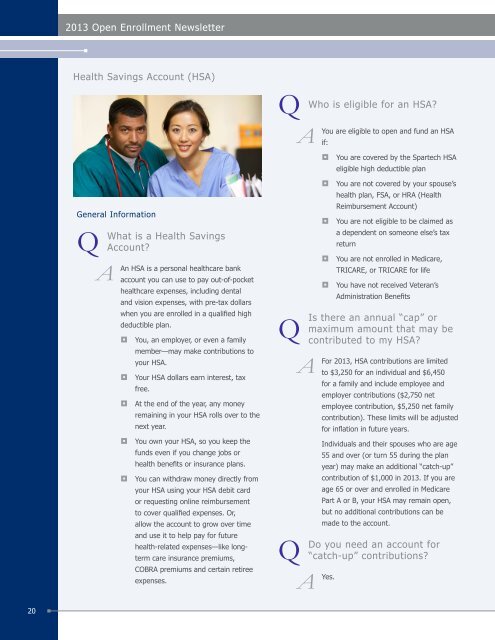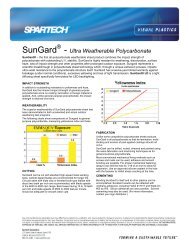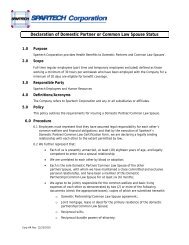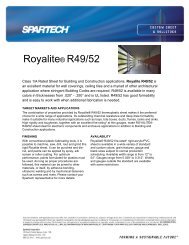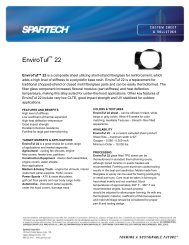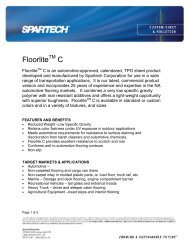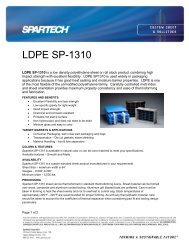2013 Benefits Newsletter - Spartech Corporation
2013 Benefits Newsletter - Spartech Corporation
2013 Benefits Newsletter - Spartech Corporation
You also want an ePaper? Increase the reach of your titles
YUMPU automatically turns print PDFs into web optimized ePapers that Google loves.
<strong>2013</strong> Open Enrollment <strong>Newsletter</strong><br />
Health Savings Account (HSA)<br />
General Information<br />
Q<br />
What<br />
A<br />
An<br />
is a Health Savings<br />
Account?<br />
HSA is a personal healthcare bank<br />
account you can use to pay out-of-pocket<br />
healthcare expenses, including dental<br />
and vision expenses, with pre-tax dollars<br />
when you are enrolled in a qualified high<br />
deductible plan.<br />
<br />
<br />
<br />
<br />
<br />
You, an employer, or even a family<br />
member—may make contributions to<br />
your HSA.<br />
Your HSA dollars earn interest, tax<br />
free.<br />
At the end of the year, any money<br />
remaining in your HSA rolls over to the<br />
next year.<br />
You own your HSA, so you keep the<br />
funds even if you change jobs or<br />
health benefits or insurance plans.<br />
You can withdraw money directly from<br />
your HSA using your HSA debit card<br />
or requesting online reimbursement<br />
to cover qualified expenses. Or,<br />
allow the account to grow over time<br />
and use it to help pay for future<br />
health-related expenses—like longterm<br />
care insurance premiums,<br />
COBRA premiums and certain retiree<br />
expenses.<br />
Q<br />
Who<br />
Q<br />
Is<br />
A<br />
You<br />
A<br />
For<br />
is eligible for an HSA?<br />
are eligible to open and fund an HSA<br />
if:<br />
<br />
<br />
<br />
<br />
<br />
You are covered by the <strong>Spartech</strong> HSA<br />
eligible high deductible plan<br />
You are not covered by your spouse’s<br />
health plan, FSA, or HRA (Health<br />
Reimbursement Account)<br />
You are not eligible to be claimed as<br />
a dependent on someone else’s tax<br />
return<br />
You are not enrolled in Medicare,<br />
TRICARE, or TRICARE for life<br />
You have not received Veteran’s<br />
Administration <strong>Benefits</strong><br />
there an annual “cap” or<br />
maximum amount that may be<br />
contributed to my HSA?<br />
<strong>2013</strong>, HSA contributions are limited<br />
to $3,250 for an individual and $6,450<br />
for a family and include employee and<br />
employer contributions ($2,750 net<br />
employee contribution, $5,250 net family<br />
contribution). These limits will be adjusted<br />
for inflation in future years.<br />
Individuals and their spouses who are age<br />
55 and over (or turn 55 during the plan<br />
year) may make an additional “catch-up”<br />
contribution of $1,000 in <strong>2013</strong>. If you are<br />
age 65 or over and enrolled in Medicare<br />
Part A or B, your HSA may remain open,<br />
but no additional contributions can be<br />
made to the account.<br />
Q<br />
Do you need an account for<br />
“catch-up” contributions?<br />
A<br />
Yes.<br />
20


